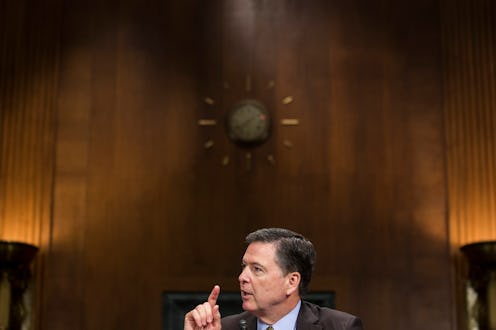News
Experts Aren't So Sure Trump Can Stop Comey From Testifying

Much attention has returned to the alleged ties between Russian officials and President Donald Trump's campaign with reports from The New York Times that former FBI Director James Comey has been cleared to testify as early as next week before the Senate Intelligence Community. Questions still remain as to whether Trump could still stop Comey's testimony, particularly as CNN reports that sources close to the former FBI director believe he'll shed further light on the hairy allegations detailed in his memos that Trump sought to end investigations into former National Security Adviser Michael Flynn (prior to his resignation in February). Trump has denied ever asking Comey to end an investigation.
Though the White House denied the allegations following the release of the memos, Trump could still invoke executive privilege, as is his constitutional right, to keep those conversations secret. But choosing to invoke that privilege remains a controversial one. While blocking Comey's testimony, the decision could still yield complications for Trump in the long term, as Mark J. Rozell, professor at George Mason University and expert on executive privilege, told The Times:
If they claim executive privilege, politically it gives the appearance that there’s something to hide, which just amplifies all the criticism.
And still, some experts still believe that Trump's ability to invoke executive privilege remains up in the air. For one, he revealed publicly (via Twitter and in a much-discussed interview with NBC News' Lester Holt) that he had conversations concerning the Russia probe with Comey. Trump also mentioned potential recordings of said conversations and implied that the investigations may have played a role in his decision to oust the former FBI director (which could lead to further allegations of obstruction). Thus, Trump's ability to block Comey isn't guaranteed.
As professor of constitutional law at Harvard Law School Laurence H. Tribe tweeted on May 12, going public about the conversations makes it difficult for Trump to actually silence Comey.
Tribe's opinions line up with Rozell's other comments alleging the president "has not been careful," telling The Times:
How can you amplify your views publicly and then, in response to a legitimate inquiry, say "I’m sorry, I can’t talk about that"?
Additionally, Justice Department Special Counsel Robert S. Mueller, who was appointed to the case earlier this month, also has the power to demand documents and testimony for his investigators as well, regardless of whether privilege is invoked.
Though there's no date set for Comey's testimony (other than within the next week), it seems highly unlikely that those seeking to get a clearer picture of the conversations between Trump and Comey will walk away — executive privilege or not.